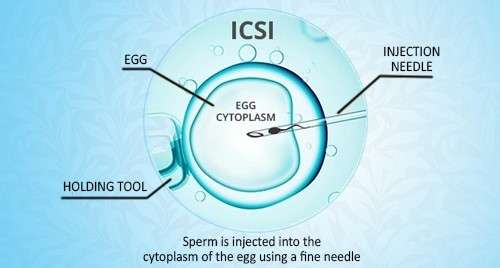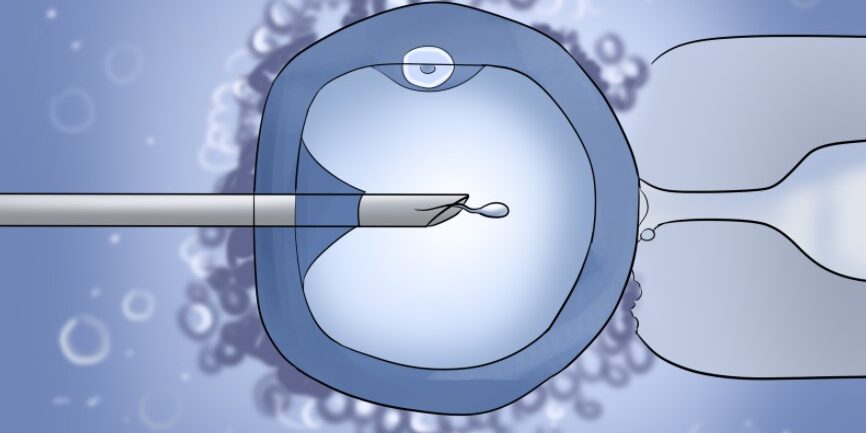The procedure of injecting the sperm cell into the egg’s cytoplasm is known as ICSI treatment (Intra Cytoplasmic Sperm Injection). It is a specialized form of In Vitro Fertilisation (IVF). It is usually used for the treatment of severe cases of male infertility.
ICSI treatment includes the injection of a single sperm directly into a mature egg. It is performed in parallel with the IVF treatment.
When is ICSI treatment beneficial?
When the sperm does not have to travel to the egg or penetrate the egg’s outer layers, your IVF doctor may recommend an ICSI procedure.
Also, ICSI can help if there are any difficulties in achieving fertilization due to male infertility causes. Some factors include:
- Low sperm count
- Reduced sperm motility
- The inability of sperm to penetrate the egg
- Unsuccessful IVF procedure in the past
Some other causes when ICSI can help include:
- You are using frozen sperms, and the sperm does not appear active.
- You are going for PGD (preimplantation genetic diagnosis).
- In your previous IVF cycles, fertilization did not occur. Even though the numbers of eggs were high and sperms were healthy.
- If you use frozen oocytes and the eggshells become hardened.
- Opting for IVM (in vitro maturation) where eggs are retrieved before maturity. In such a case, ICSI is very effective
How is ICSI treatment performed?

ICSI treatment procedure is similar to an IVF treatment. This is how your specialist will carry it out:
- You will get fertility drugs to stimulate your ovaries. It will develop several mature eggs for fertilization.
- When eggs are ready for collection, your IVF specialist will retrieve them through a short outpatient procedure.
- These collected eggs are used immediately or frozen for later use.
- Meanwhile, the sperms retrieval happens from the semen sample of the male partner. These sperms are tested, and your doctor chooses the single best sperm.
- Your sperm is injected carefully into the cytoplasm of the egg through fine needles. Also, your specialist will carry out this entire procedure of fertilization under a very powerful microscope.
- Your fertilized egg is then placed in the incubator. Such an egg starts showing signs of fertilization after 24 hours. After that, the egg continues to divide and forms an embryo.
- After the embryo is 3 days old, having 8 cells, your doctor may transfer it to the mother’s uterus. The transfer can also happen on the 5th day and is called a Blastocyst transfer.
- If you are having one embryo transferred, having a blastocyst transfer can improve your chances of a successful, healthy pregnancy.
- If all goes well, the embryo will attach to your uterus wall. After that, it will continue to grow to become your baby.
- After 2 weeks or so, you will be able to take a pregnancy test.
The success rate of ICSI in male infertility
ICSI couples with male factor infertility achieve a 70 to 80 percent fertilization rate for all eggs injected. It is equivalent to fertilization with normal sperm.
The pregnancy rates achieved through ICSI are comparable with those attained through IVF in couples with no male factor infertility.
Advantages of ICSI treatment
Some of the benefits of ICSI include:
- ICSI uses eggs of the highest quality and treats severe infertility in men.
- Solves infertility problems due to low sperm count, poor sperm motility, or low sperm quality.
- ICSI increases the chances of fertilization during In-Vitro Fertilization (IVF).
- ICSI is also an excellent option if you have a vasectomy.
Risks associated with ICSI infertility treatment
Usually, a normal pregnancy has about 1.5 to 3 per cent risk of significant congenital disabilities. ICSI has a slightly increased rate of congenital disabilities, which is still very rare.
Researches state that babies are born using artificial insemination may have a risk of imprinting defects.
Imprinting is when some baby genes act differently depending on the chromosome passed by the father or mother. However, some researchers believe that imprinting defects occur even in a natural pregnancy.
Aside from imprinting defects, needle insertion may damage about 5 percent of the eggs. Furthermore, chromosome abnormality in ICSIis 4 times more than standard conception.
Some of the issues related to sex chromosome abnormalities:
- Increased risk of behaviour or learning disabilities
- Risk of miscarriages
- Heart conditions
- High risk of infertility in your children during their adulthood. It happens because the father passes male infertility genetically.
Although researchers believe that ICSI leads to congenital disabilities, causes may also include abnormalities in the couples taking the procedure. If you are planning on an ICSI treatment, consult with your doctor. They can guide you about the risks and complications regarding the ICSI procedure.

